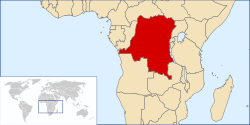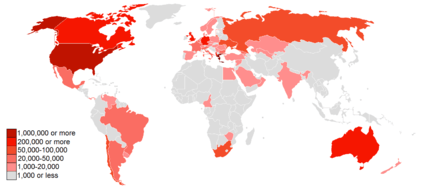Greeks in the Democratic Republic of the Congo

The first Greek communities in the Democratic Republic of the Congo were established prior to the colonization of the country by Belgium.[1] The Greek presence in the Congos reached a peak in the 1950s when many Greeks fled Egypt as their properties were seized by the nationalist government there. The Greek communities organized their own schools and churches and Greeks were active in trade, fishing, transport, coffee growing and the music industry.[1] Also, a small group of Greek Jews emigrated to the DR. Congo.
History
In the early to mid 20th century nearly all Congolese cities on the Belgian side had a Greek community and usually all hailing from a particular part of Greece as people would arrive, get settled in and send for their families.[2] By the 1920s there were established Greek fishing and trading communities in the trading cities of Luapula and Katanga, where the Greeks plied the river trade of the Congo, ranging as far as Zambia where many settled. The traders and fishermen developed a good and likable reputation and cultivated good relations with their Congolese and Zambian colleagues as they were always ready to offer help or lend their equipment and traditional Greek skills in net and boat making.[3] Later the Congolese Greeks played a significant role in launching the country's important music tradition by founding several recording companies like Olympia, Ngoma, Opika and others.[2] When the country declared its independence in 1960 there were violent clashes and uncertainty followed by three decades of authoritarian rule by Mobutu Sese Seko which led to the exodus of most Greek settlers and the decline of the Greek community. Today there are about 100 Greeks left in the capital Kinshasa and 200 in Lubumbashi. The holy temple of Saint George and the Club Hellenique are the focal points of the community.[4] In response to the 2008 humanitarian emergency in the Congo Greece dispatched $500,000 in aid.[5]
Language
Most Greeks speak French as their native language. Some can only speak Greek, with others speaking Bantu languages.
See also
References
- 1 2 Hellenic Republic: Ministry of Foreign Affairs: Democratic Republic of Congo: The Greek Community
- 1 2 Gary Stewart, Rumba on the River, Verso, 2003, ISBN 1-85984-368-9, ch. 2
- ↑ Hansen, Karen Tranberg (2000). Salaula: The World of Secondhand Clothing and Zambia. University of Chicago Press. p. 72–74. ISBN 0-226-31580-0.
- ↑ Declan Walsh, City Life: Kisangani - Congo's last few Greeks look back in wonder, The Independent, (London), Oct 2, 2000
- ↑ Greek aid to Congo
